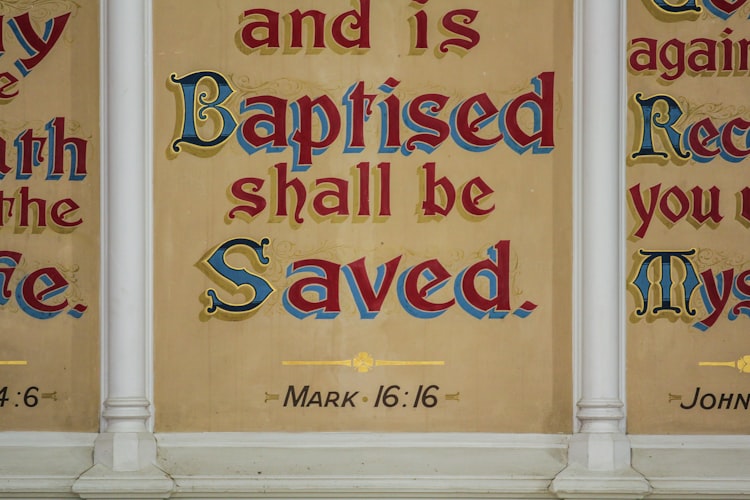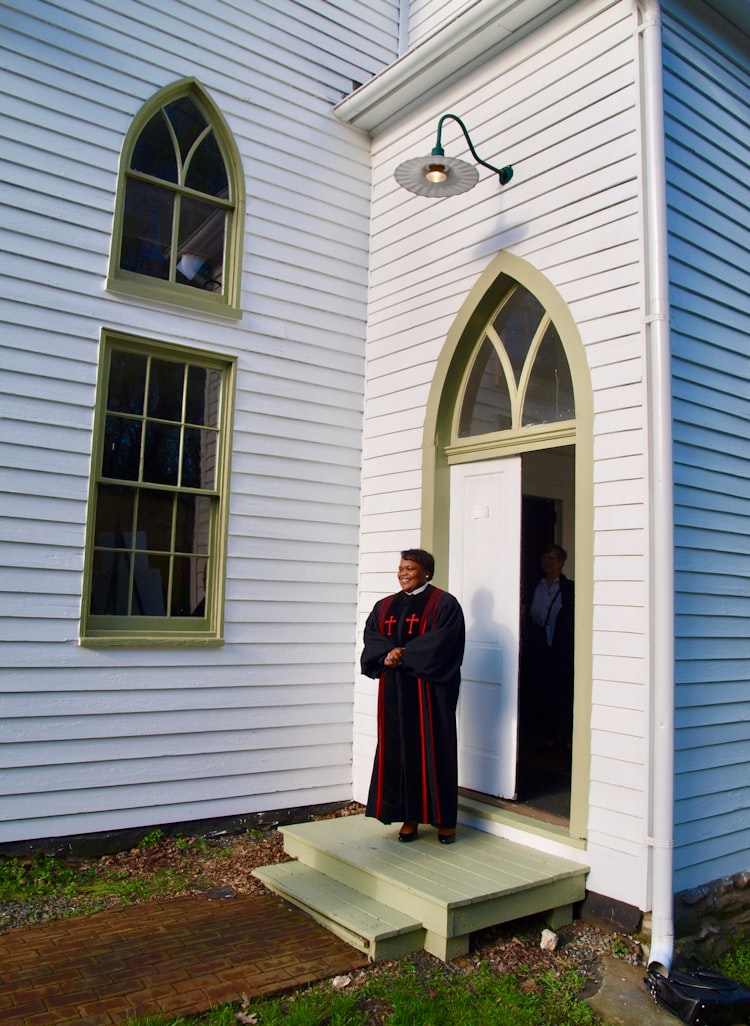How to Edit the Bible Like Jesus
I recently preached on two of Moses’ encounters with God. The first, in Exodus 3, Moses meets God at the burning bush. Moses, anticipating questions from the Israelites he’s been asked to deliver out of Egypt, asks what he should call this God. God reveals the divine name Yahweh and—after some hemming and hawing—sends Moses on his way.
In the second encounter, in Exodus 34, Moses asks God to reveal his full glory to him. God more or less says, “Yeah, sure, let’s give it a shot.” The way that the reader of Exodus—not able to be present on Mt. Sinai—experiences this divine revelation of God’s glory is to read a declaration of God’s “full legal name.” Exodus 34:6-7 says God’s name is:
The Lord, the Lord,
a God merciful and gracious,
slow to anger,
and abounding in steadfast love and faithfulness,
keeping steadfast love for thousands,
forgiving iniquity and transgression and sin,
but who will by no means clear the guilty,
visiting the iniquity of the fathers
upon the children and the children’s children,
to the third and the fourth generation. (Exodus 34:6-7 RSV)
However, when I read this passage on Sunday, I didn’t read the bolded text. I left it out on purpose. In other words, I edited the Bible.
gasps Evangelically
It should be no surprise that most traditional Christians do not smile upon editing words out of Scripture. Images of Jefferson’s Bible, with literal scissors and glue, come to mind, shaping the Bible into whatever we want it to be. And folks will likely quote Daniel and Revelation at you. “If anyone adds anything to these words, God will add to that person the plagues described in this scroll” (Revelation 22:18).
Edit the Bible, get some plagues. Cool cool cool.
However, “editing the Bible” is as old as the Bible itself. What I mean is that, within the pages of Scripture, it is common to see biblical authors quote more senior biblical authors and knowingly and intentionally change the words, drop words, or make the words mean something else entirely.
Who Tempted David?
You can see dozens of examples of editing and shifting the biblical text by comparing Samuel-Kings (generally seen as the work of one school of writers and editors) with Chronicles. Chronicles retells much of the history of Samuel-Kings, but with a different set of priorities. Whereas Samuel-Kings shows a decent amount of suspicion towards Israelite kingship and even the existence of the Solomons’ Temple, Chronicles is unapologetically pro-throne and pro-temple. For instance, in Chronicles, David’s rape of Bathsheba is entirely removed.
But there are also less blatant examples of theological shifting that happened between the composition of Samuel-Kings and the composition of Chronicles. In 2 Samuel 24:1, it reads:
Again, the anger of the Lord was kindled against Israel, and he incited David against them, saying, “Go, count the people of Israel and Judah (2 Samuel 24:1 NRSV).
The Hebrew word for “incite” can also mean tempt or entice. Now later Jewish writers would state pretty emphatically, “When tempted, no one should say, ‘God is tempting me,’ because God cannot be tempted or tempt anyone” (James 1:13). So already, within the Christian Bible, we have some “tension” (what ordinary people might call contradiction).
Well, if you’re the author-editor of Chronicles, you also feel pretty confident that whoever wrote 2 Samuel must have been on crack (or had a highly problematic view of God). So, what do you do? You fix it!
Satan stood up against Israel, and incited David to count the people of Israel (1 Chronicles 21:1 NRSV).
Fixed! God doesn’t tempt people, but Satan does. So the author-editor of Chroncicles took it upon themselves to repair what the editors of Samuel-Kings clearly got wrong.
Does God Punish Children Because of Their Parents?
Back to Exodus 34, God is pretty clear that divine justice entails punishing children for their parent's sins. It's so vital that it's part of the divine name!
However, later biblical authors took issue with this idea. This divine name revealed to Moses is quoted throughout the Hebrew Bible. However, that line concerning punishing children does not show up in any other quotation of this Exodus passage. [^ Nehemiah 9:17, Psalm 86:15; Psalm 103:8; 145:8; Joel 2:13; Jonah 4:2.]. Joel and Jonah add a line stating that God is the One who "relents of disaster."
The prophet Ezekiel goes one step further. In Ezekiel 18, there is a rhetorical back-and-forth between God and an Israelite. The Israelite argues that God should punish children for the sins of their parents. But God emphatically says, "No!"
"I will judge you according to your conduct...a son will not suffer the punishment for the father's guilt."
Ezekiel, having received a more complete revelation of God's character, entirely contradicts Moses' description of God in Exodus 34 (and Numbers 14:18). This contradiction is not a sign of the Bible's faultiness, but rather its trustworthiness. Human understanding of God is not static but instead has grown over time. While those who put together Exodus 34 were, I believe, receiving a genuine revelation of God's character, they also tinged it with a very human desire for vengeance, even against innocent children. Ezekiel and later biblical writers did not feel beholden to that violent depiction of God. Instead, they felt the freedom to revise their prior incorrect notions about God and help people understand an even more beautiful report of what God is like. And this process of (mis)understanding, revision, and new understanding is actually written into the Bible.
Jesus Edits Out the Day of Vengeance
One last example is from Jesus' inaugural sermon in his hometown synagogue in Nazareth (Luke 4:14-30). Jesus reads from the scroll of the prophet Isaiah:
The Spirit of the Lord God is upon me,
Because the Lord anointed me
To bring good news to the humble;
He has sent me to bind up the
brokenhearted,
To proclaim release to captives
And freedom to prisoners;
To proclaim the favorable year of the Lord
And the day of vengeance of our God.
Except...Jesus doesn't read the line in bold above. The day of vengeance? Never heard of it!
You could argue, if you really wanted to be that guy, that Jesus had to stop reading somewhere, and it just so happened that was the stopping place. But that misses the more significant point of Jesus' sermon, which is Gentile inclusion (see Luke 4:23-27). This attempt at inclusion gets Jesus almost thrown off a cliff. It also highlights that Jesus is quite comfortable taking a chapter of Scripture, in this case, Isaiah 61, and making it about something different than the original author intended. Isaiah 61 is about the restoration of the Jewish land. But Jesus’ explanation changes it to God’s intention to make one people out of all the world's nations.
Jesus Himself is the fulfillment of many prophetic expectations. Even His cousin John the Baptist indulges in some revenge fantasy about what the Messiah will do when he shows up on the scene.
The ax is already at the root of the trees. Every tree that doesn’t produce good fruit will be chopped down and tossed into the fire. The one who is coming after me is strong than I am. He will baptize you with fire. He will clean out his threshing area and burn the husks with a fire that can’t be put out. (Matthew 3:10-12).
Jesus, however, utterly fails to throw anyone into a fire. He heals people, feeds people, forgives people, and, yes, brashly confronts religious oppressors. But He never engages in violence or physically harms anyone. Instead, He dies the most humiliating death, legions of angels to rescue Him be damned. Yes, he’s vindicated in the resurrection, but even after that, he fails to lift so much as a single butter knife against his enemies.
Jesus not only edits out this whole vengeance business, but He also refuses to engage in it Himself. The prophetic expectations of Yahweh showing up in the world came true through Jesus. But God-in-the-flesh refused to engage in the violent vengeance everyone expected and, quite frankly, desired.
We’re Invited to Edit the Bible As Well
With the examples of Chronicles, Ezekiel, Jesus, and many more we didn’t name today before us, we too are meant to edit the Bible. Not into our own image, but into the image of Christ, who is God. The attitude of “The Bible says it, I believe it, that settles it” is, ironically, one of the least “biblical” ways of reading Scripture you could come up with. Through the centuries, Biblical authors and readers have wrestled with, argued with, and even edited people’s recollections of God to more accurately reflect what God is really like. The author of Hebrews says it best:
In the past, God spoke through the prophets to our ancestors in many times and many ways. In these final days, though, he spoke to us through a Son. (Hebrews 1:1-2)
By recognizing Jesus as the complete revelation of God’s character, I’m not denying that God spoke through those who came before. But, ultimately, Moses, David, and the prophets all submit to Jesus. Therefore, as Christian readers of Scripture, it's our duty and our joy to reread—and even edit—Scripture to more accurately reflect what we now know about God.



Member discussion